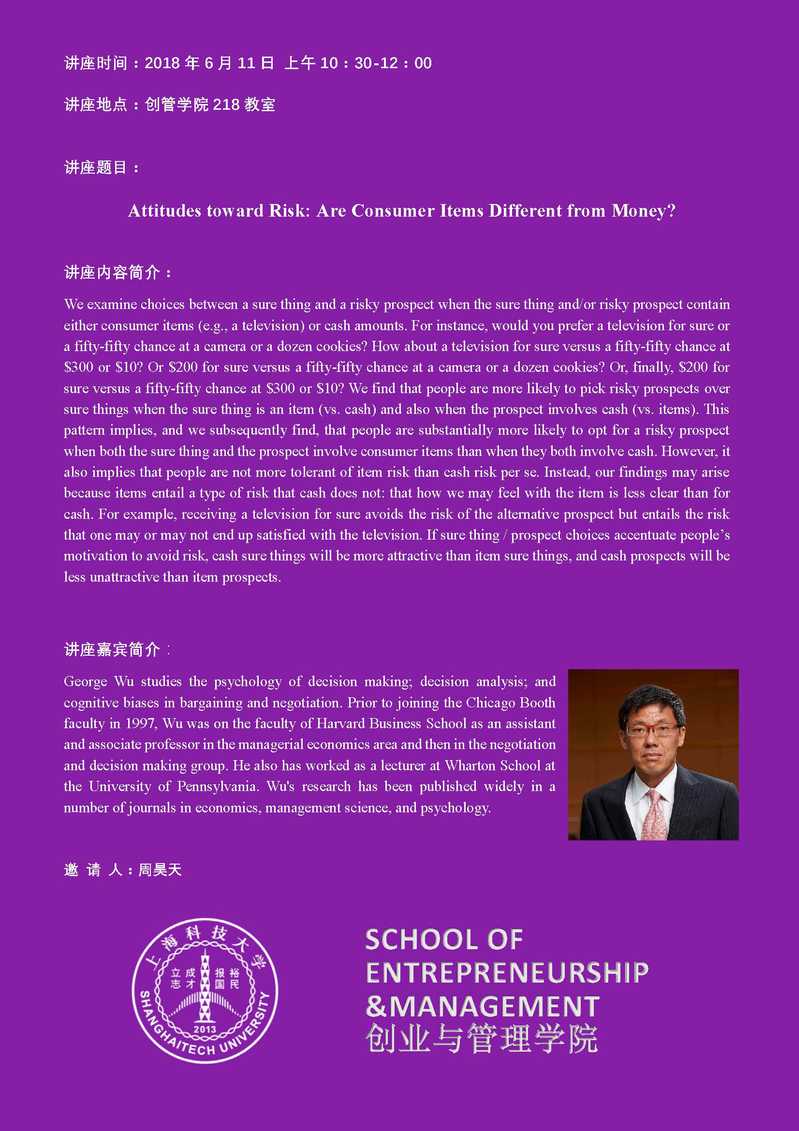讲座时间:2018年6月11日 上午10:30-12:00
讲座地点:创管学院218会议室
邀请人:周昊天
讲座内容简介:
We examine choices between a sure thing and a risky prospect when the sure thing and/or risky prospect contain either consumer items (e.g., a television) or cash amounts. For instance, would you prefer a television for sure or a fifty-fifty chance at a camera or a dozen cookies? How about a television for sure versus a fifty-fifty chance at $300 or $10? Or $200 for sure versus a fifty-fifty chance at a camera or a dozen cookies? Or, finally, $200 for sure versus a fifty-fifty chance at $300 or $10? We find that people are more likely to pick risky prospects over sure things when the sure thing is an item (vs. cash) and also when the prospect involves cash (vs. items). This pattern implies, and we subsequently find, that people are substantially more likely to opt for a risky prospect when both the sure thing and the prospect involve consumer items than when they both involve cash. However, it also implies that people are not more tolerant of item risk than cash risk per se. Instead, our findings may arise because items entail a type of risk that cash does not: that how we may feel with the item is less clear than for cash. For example, receiving a television for sure avoids the risk of the alternative prospect but entails the risk that one may or may not end up satisfied with the television. If sure thing / prospect choices accentuate people’s motivation to avoid risk, cash sure things will be more attractive than item sure things, and cash prospects will be less unattractive than item prospects.
讲座嘉宾简介:
George Wu studies the psychology of decision making; decision analysis; and cognitive biases in bargaining and negotiation. Additionally, he has received research funding as part of a 3-year, $3.6 million project entitled Enhancing the Human Experience through Behavioral Science: New Paths to Purpose to advance the behavioral science of purpose. Project research explores how people adopt, pursue, and fulfill their intentions to accomplish something that is meaningful to the self, and often is of consequence to the world beyond the self.
Wu's research has been published widely in a number of journals in economics, management science, and psychology, including Cognitive Psychology, the Journal of Personality and Social Psychology, the Journal of Risk and Uncertainty, Management Science, Psychological Science, and the Quarterly Journal of Economics.
Prior to joining the Chicago Booth faculty in 1997, Wu was on the faculty of Harvard Business School as an assistant and associate professor in the managerial economics area and then in the negotiation and decision making group. He also has worked as a lecturer at Wharton School at the University of Pennsylvania. Prior to graduate school, Wu worked as a decision analyst at Procter & Gamble.
Wu is a former department editor of Management Science and is on numerous other editorial boards, including Decision Analysis, Journal of Behavioral Decision Making, Journal of Risk and Uncertainty, and Theory and Decision. He earned a bachelor's degree cum laude in applied mathematics with a concentration in decision and control in 1985, a master's degree in applied mathematics in 1987, and a PhD in decision sciences in 1991, all from Harvard.




